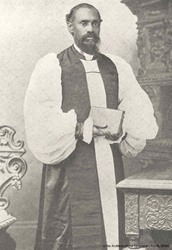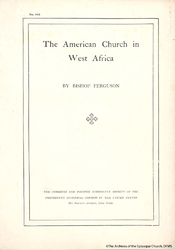Leadership Gallery
The Right Reverend Samuel David Ferguson, 1842-1916
Samuel David Ferguson was born in Charleston, South Carolina. His family emigrated to Liberia six years later where he attended mission schools. Appointed a teacher in 1862, he began his studies for the ministry and was ordained deacon in 1865 and a priest two years later. He served as assistant minister and later as rector of St. Mark’s, Harper, in Liberia. Ferguson had a special interest in education, which was demonstrated in his work. He founded Cuttington College in Liberia, the Julia C. Emery School and countless other schools in local villages. Consecrated in 1885 as the Missionary Bishop of Cape Palmas and its adjacent territory, the diocese later being changed to that of Liberia and West Africa, he was the first American-born black person to become Bishop of Liberia and the first African American member of the House of Bishops. As the fourth Bishop of Liberia, Ferguson made a significant impact on the spiritual and educational growth of the Church in Liberia and on the country itself.
Cuttington College
Bishop Ferguson established Cuttington College in 1889. With the aid of a $5,000 gift from Robert F. Cutting, the treasurer of the Board of Missions, Ferguson purchased 100 acres of land, hired an all-Liberian staff, and built Epiphany Hall, the school's first permanent structure. Over the years, other permanent buildings would replace the remaining initial thatched hut structures of Cuttington. The school's departments included theological, agricultural, and industrial education. Ferguson’s purpose for the school was to give the youth of Liberia and Africa the skills to meet the physical and spiritual needs of a growing nation. Despite being closed for nearly twenty years during a devastating civil war, Cuttington College still exists to fulfill Bishop Ferguson's vision. [Sources]



